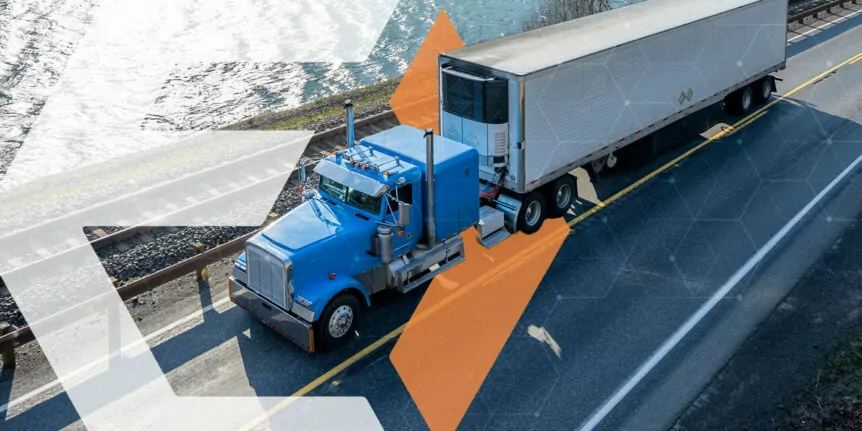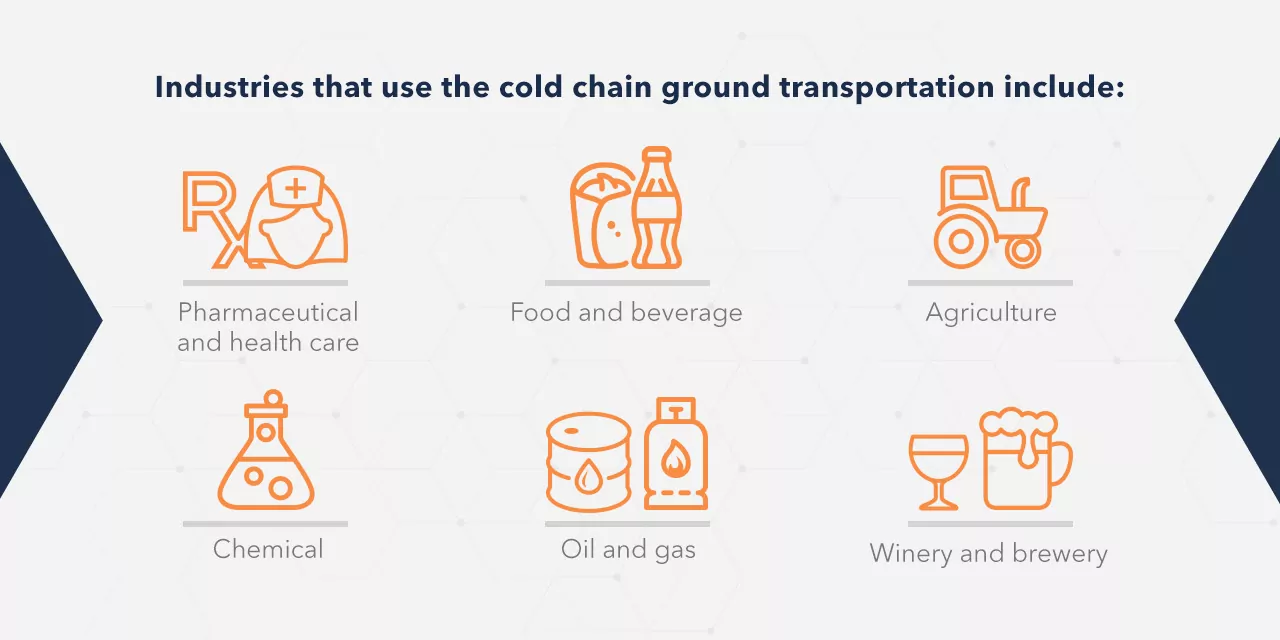Delivering food and pharmaceuticals at specific temperatures is essential to maintaining their integrity and safety. Delivery is an integral part of the cold chain logistics process, which ensures that items transported to consumers or businesses are damage-free and safe to use.
Temperature-sensitive items must adhere to strict regulations and guidelines from organizations like the Food and Drug Administration (FDA). Cold chain courier delivery maintains specific low temperatures during delivery — from cool conditions around 59 degrees Fahrenheit to ultra-low temperatures of minus 230 degrees F.
Cold chain delivery helps preserve the quality of these items. Perishable products stay fresh longer, and medical items remain effective. The process reduces waste, preventing companies from losing profits and allowing end-users to receive quality products.
Learn more about cold chain delivery, the items that qualify for cold chain logistics and the cold chain ground transportation best practices.
What Is Cold Chain Logistics?
Temperature-sensitive items must go through specific and strict cold chain services to maintain their quality and effectiveness. Here is a quick breakdown of the components of cold chain logistics:
- Manufacturers: This is where the items come from, including farms, manufacturing plants, and health care and pharmaceutical facilities.
- Cold storage facility: A cold storage facility is a warehouse specifically designed to house temperature-sensitive goods and supplies before transportation. It includes cold rooms and deep freezers.
- Packaging: Proper packaging will enhance items’ safety, longevity and quality. Packaging often includes dry ice and polystyrene, which will help products maintain colder temperatures.
- Refrigerated trucks: These trucks can keep temperatures down while transporting materials.
- Tracking and monitoring: Real-time tracking allows businesses to track the courier’s location at all times. Monitoring uses software that can provide data regarding the temperatures in the vehicle.
- Delivering: Cold chain delivery is the last step in logistics, often called last-mile delivery. It plays an essential role and could influence delivery duration and external factors such as delays.
What Qualifies for Cold Chain Delivery?
Specific goods must be refrigerated to ensure that they stay fresh and usable. Here is a list of items that qualifies for cold chain delivery:
- Blood and lab samples: Refrigeration reduces chemical reactions in samples, maintaining the blood cells and molecules. Samples are usable for longer and provide efficient and accurate data collection.
- Organ transplant: Medical personnel place organs in insulated boxes filled with ice to accommodate transportation, allowing the organs to remain usable and slowing down cell degradation.
- Vaccines: Vaccines must be stored at controlled temperatures to ensure they are safe for users. Cold temperatures increase the vaccine’s efficacy so that it remains potent for its intended function.
- Fresh fruit and vegetables: Cold temperatures keep food and vegetables fresher for extended periods. Transporting food at low temperatures slows down ripening, discoloration, bruising, yeast and mold. Fruits and vegetables that need cold chain delivery include broccoli, apples, berries, carrots, cucumbers, and more.
- Dairy products: Milk, cream and yogurt can spoil, curdle, become sour and have an unpleasant smell. Higher temperatures in cheese can affect the texture and accelerate bacterial growth.
- Wine: Chemical reactions caused by high or too-low temperatures can affect the flavor and aroma as the wine ages.
- Eggs: While many recipes call for room-temperature eggs, refrigerated eggs last longer and are safer for consumers. Bacteria can penetrate the shell and cause salmonella, making them unsafe for consumption.
- Frozen food and desserts: You must store frozen food at freezing temperatures. Thawing can increase bacteria and affect the quality of the food.
- Meat, poultry and seafood: Perishable items such as meat, poultry and seafood can grow harmful bacteria that can cause food poisoning, salmonella and E.coli.
- Cakes and pastries: Refrigeration of cakes and pastries depends on the toppings, such as fruit, cream and frosting, that can become sour.
- Chemicals: Chemicals are made from various components that can create reactions at varied temperatures. Too high or low temperatures can release gasses, increase the risk of combustion, and harm handlers and the environment.
Industries that use the cold chain ground transportation include:
- Pharmaceutical and health care.
- Food and beverage.
- Agriculture.
- Chemical.
- Oil and gas.
- Winery and brewery.
Challenges of Cold Chain Ground Transportation
Consequences of storing temperature-sensitive food at the wrong temperature include bacterial growth and unusable items. While cold storage and packaging help maintain temperatures, ground transportation still faces unique challenges that can affect the overall cold chain process. Here are a few challenges that affect cold chain courier delivery:
Delivery Duration
Management knows how long the process should take to ensure the items remain in optimal conditions. However, if the delivery takes more time than anticipated due to delays, traffic or rerouting, it could affect the freight. This is especially critical for time-sensitive pharmaceutical and medical supplies.
High Transportation Costs
Cold chain logistics differs significantly from the typical supply chain process. Cold chain logistics requires specialized equipment and packaging to keep items at controlled temperatures. While active cold packaging, reefers and temperature monitoring systems are investments, they can become costly to purchase, maintain and transport.
Delivery Vehicle Breakdown
A cold chain delivery vehicle breaking down while in transit can result in costly and harmful consequences. Cold chain managers must send out roadside assistance to help them fix the issue promptly — which will take considerable time and money.
If the problem persists, couriers must find an additional truck to transport the goods. Items will be taken from the containers and exposed to the elements and outside temperatures, humidity and contaminants.
Tracking and Monitoring Issues
Tracking systems can follow couriers in real time to provide accurate data on estimated arrival times. Monitoring systems can also help track vehicle temperatures. However, these devices may not always be accurate, which can cause issues.
How Couriers Ensure Proper Transportation Conditions
The cold chain ground transportation protocol allows for the safe delivery of items while in the final stretch of the logistics process. Take a look at the cold chain best practices that ground transportation companies should follow:
- Refrigerated trucks: Reefer containers are essential to cold chain delivery. They keep temperature-sensitive goods at their required temperatures while in transit.
- Temperatures monitoring: Global positioning systems (GPS) and global systems for mobile communication (GSM) help keep track of cargo. With them, companies can monitor the temperatures in the container or vehicle.
- Suitable cold packaging: Depending on the items, couriers use various active and passive cold packaging to keep products cool. Proper packaging includes dry ice, gel packs and bottles, insulated containers and deep freezers.
- Temperature maintenance: Couriers should also check temperatures during stops to ensure that the required conditions are maintained during transportation. This allows them to make changes or communicate with management when they detect issues.
- Perform maintenance checks on vehicles: Couriers can reduce the risk of breakdowns by maintaining their vehicles. They’ll also inspect the equipment inside the reefer to ensure it is in peak condition. Any undetected damages or breakages can affect the items.
The right delivery service will ensure that businesses and consumers receive quality and safe goods. Reliable couriers will provide the best care to your products, communicate with cold chain managers, avoid delays and maintain the specified temperatures of products.
Choose ExpressIt for Your Cold Chain Delivery Needs
At ExpressIt, we provide customized delivery services and logistics to cater to your business needs. With our same-day delivery option, you can transport time- and temperature-sensitive items without delays and in optimal conditions.
We provide dependable services to various industries, including pharmaceutical and health care. Our experienced delivery professionals will handle and transport your medical items and specimens with the best care.
To contact us, complete an online form to request a quote. Our representatives will get back to you shortly.



